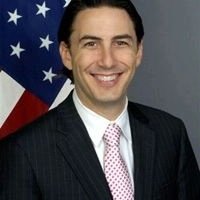Roundtable Discussion on the Southern Gas Corridor

This summer, the European Union's alternative source of natural gas was finally decided: the Shah Deniz energy consortium in Azerbaijan chose the Trans-Adriatic Pipeline (TAP) over the much-discussed Nabucco project, to bring 10-20 billion cubic meters of gas a year through Greece and Albania to Italy. The momentous choice ended over a decade of indecision on energy diversification in Southeastern and Central Europe and will provide a much needed alternative to Russian resources. The United States, through the Special Envoy for Eurasian Energy and the Bureau of Energy Resources at the State Department, spent significant diplomatic capital to realize this so-called Southern Energy Corridor to benefit NATO allies and strategic partners in the Black Sea-Caspian region. Now the question remains: what next for the Southern Energy Corridor? Was TAP the right choice? Will Nabucco's original route to Central Europe be realized? How will Russia respond?
Dr. Alexandros Petersen serves as Advisor to the European Energy Security Initiative (EESI) at the Woodrow Wilson International Center for Scholars. A scholar of energy geopolitics, he has a decade's experience conducting research across Europe and Eurasia. Dr. Petersen is the author of The World Island: Eurasian Geopolitics and the Fate of the West and co-runs chinaincentralasia.com. He has been a Senior Fellow for Eurasia and Fellow for Transatlantic Energy Security at the Atlantic Council, a Visiting Fellow with the Russia and Eurasia Program at the Center for Strategic and International Studies (CSIS) and has provided research for the National Petroleum Council’s Geopolitics and Policy Task Group. Dr. Petersen regularly provides analysis to publications such as the Economist, New York Times, Wall Street Journal, Foreign Affairs, Foreign Policy, National Interest and the Atlantic. He has appeared on the BBC, Sky News, CTV and NPR and has taught classes on energy geopolitics at the U.S. Foreign Service Institute, the U.S. National War College and the American University of Central Asia, amongst many others. He received a B.A. in War Studies with First Class Honors from King’s College London and an M.Sc. and Ph.D. in International Relations from the London School of Economics.
Amos J Hochstein currently serves as the Deputy Assistant Secretary for Energy Diplomacy at the U.S. Department of State in the Bureau of Energy Resources (ENR). In this capacity, Mr. Hochstein oversees the Office of Middle East & Asia and the Office of Europe, the Western Hemisphere & Africa where he leads the bureau’s energy diplomacy efforts. He oversees U.S. foreign policy engagement in the critical intersection of energy and national security. In this role, he focuses on promoting U.S. interests to ensure energy resources are used to increase economic opportunity, stability and prosperity around the world. Prior to joining the State Department, Mr. Hochstein spent more than 15 years advising U.S. elected officials, candidates for public office and thought leaders on domestic and global energy policy initiatives. He began his career in Washington, D.C. on Capitol Hill where he served in a variety of senior level positions, ultimately serving as the Senior Policy Advisor to the Foreign Affairs Committee of the U.S. House of Representatives. Mr. Hochstein first served as the principal Democratic staff person on the Economic Policy, Trade & Environment Subcommittee where he oversaw work authorizing Ex-Im Bank, OPIC and USTDA, as well as drafting legislation on export controls and trade-related multilateral organizations and regimes.
Michael Ratner is a specialist in energy policy at Congressional Research Service (CRS), focusing on natural gas and oil markets. His recent CRS work has addressed U.S. LNG exports, U.S. natural gas demand, alternatives to Russian natural gas for Europe, and the Bakken tight oil play. Prior to joining CRS, Mr. Ratner was a senior energy analyst at the Central Intelligence Agency, specializing in international energy security matters, particularly global natural gas issues. With over 20 years of energy experience, Mr. Ratner has worked as an investment banker in the Houston office of WestLB AG, specializing in U.S. and Canadian small to mid-sized exploration companies. He also was the lead negotiator for the sale of development rights to a Canadian liquefied natural gas import terminal. Mr. Ratner worked for four years in Enron's domestic natural gas pipeline division, focused on mergers, acquisitions and divestitures. Before Enron, Mr. Ratner worked as a project manager for Coastal Power Company, developing natural gas-fired electric generation projects in the United States and Pakistan. Mr. Ratner also has experience in various aspects of the energy industry, including as an upstream analyst for PFC Energy and staff writer for the Energy Intelligence publications. Mr. Ratner has an MS in Mineral Economics from the Colorado School of Mines, an MA in International Economics and U.S. Foreign Policy from Johns Hopkins’ School of Advanced International Studies (SAIS), and a BA in International Relations from Columbia University.
Greg Saunders is Senior Director of Government Affairs for British Petroleum in Washington DC, responsible for the Caspian, Middle East, North Africa, and Europe. He joined the Washington office in August 2004 after a posting as the C&EA Manager within the Algeria Business Unit. Prior to joining BP in 2001, Saunders was the Director for Policy at the Corporate Council on Africa, a corporate NGO in Washington. He culminated a career with the US military in 2000 following assignments in the Office of the Secretary of Defence. Saunders has been posted to Europe, Africa, Asia, and the Middle East. Saunders holds a MBA from George Washington University, a M.A. in International Relations from the Naval Postgraduate School, and a B.S. in Engineering from West Point. He serves on the boards of the American-Turkish Council, the America-Georgia Business Council, and the US-Algeria Business Council.
Lorenzo Galanti is the head of the Economic, Commercial and Scientific Affairs Office at the Embassy of Italy in Washington, DC. Previously, he served as the Embassy’s First Counselor and Chief of Staff to the Secretary General. Galanti boasts an extensive diplomatic career and has held appointments in missions in West Africa and the Middle East. He received his public service training at the Ministry of Foreign Affairs, where he worked as part of the Cultural Relations Bureau, as well as the Press and Institutional Communication Service and the Bureau of HR. Galanti holds a degree in Political Science from the University of Florence, Italy.
Speakers


Hosted By

Global Europe Program
The Global Europe Program is focused on Europe’s capabilities, and how it engages on critical global issues. We investigate European approaches to critical global issues. We examine Europe’s relations with Russia and Eurasia, China and the Indo-Pacific, the Middle East and Africa. Our initiatives include “Ukraine in Europe”—an examination of what it will take to make Ukraine’s European future a reality. But we also examine the role of NATO, the European Union and the OSCE, Europe’s energy security, transatlantic trade disputes, and challenges to democracy. The Global Europe Program’s staff, scholars-in-residence, and Global Fellows participate in seminars, policy study groups, and international conferences to provide analytical recommendations to policy makers and the media. Read more
